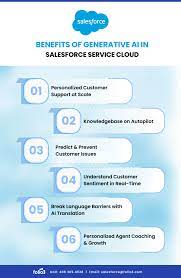Salesforce Service Cloud users are set to receive more Einstein 1 generative AI tools in June and October. A key development is the expansion of automated customer conversations across more sales and marketing platforms. Generative AI and Service Cloud family of tools is growing.
This insight aims to uncover the numerous use cases of generative AI in the modern contact center. We’ll help you understand how generative AI can fast track your contact center’s efficiency, improve data analysis capabilities, streamline QA and coaching processes, and make customers’ experiences better.
Today, Salesforce launched Unified Conversations for WhatsApp, which automates bot responses to customer inquiries related to targeted marketing messages on the popular messaging app. Additionally, Salesforce plans to extend support to Line, a messaging app popular in Japan, later this year.
These services are built on Salesforce’s Einstein 1 generative AI platform. The platform’s bots aggregate structured and unstructured CRM, product, service, and other data through Salesforce Data Cloud to generate personalized responses. These new features enable conversations to be routed to the digital channels where a Salesforce user’s customers are the most active. And to move omnichannel as customers needs change.
Salesforce is also introducing a “bring your own channel” connector to support digital channels not natively covered by the platform. Current examples might include TikTok, Discord, and South Korea’s KakaoTalk, according to Ryan Nichols, Chief Product Officer for Salesforce Service Cloud.
Generative AI and Service Cloud
“It’s about getting data from all your conversations with customers from Service Cloud into Data Cloud and using that to not just deliver excellent customer service, but also grow your business,” Nichols said.
Salesforce Einstein Conversation Mining, a Service Cloud feature currently in beta, aggregates conversations across customer channels to surface insights on the topics customers need help with. This aims to turn inbound customer service from a cost center into a revenue center, a goal long pursued at conferences like Dreamforce and ICMI. This massive change drives more than revenue, it drives ROI. Performance metrics such as time-to-answer and hold-time reduction have traditionally pressured agents to minimize call duration to retain their jobs. Now Salesforce is going to help them.
While some skeptics question if generative AI can achieve this ambitious goal, Constellation Research analyst Liz Miller suggests it might be possible. Having previously managed a contact center herself, Miller recognizes the transformative potential of generative AI. With the aid of data, bots, and copilot counterparts assisting humans, agents could save time and access the right information to upsell customers during service engagements.
Here are some of the ways Generative AI will change customer service forever.
1. Monitor and Ensure Compliance
Maintaining compliance is crucial for fostering customer trust, preserving a positive brand image, and avoiding hefty privacy and compliance fines. In a contact center, compliance mistakes can quickly escalate into costly lawsuits and revenue losses.
Generative AI allows your compliance team to proactively manage compliance by quickly identifying trends and addressing issues in real time. Instead of waiting for a compliance issue to escalate, you can fine-tune your AI model to provide compliance insights whenever necessary. For instance, you can ask:
- “Did any agents forget to properly authenticate customers before proceeding with the call?”
- “Do customers mistakenly provide sensitive payment details to agents? How do agents react?”
- “What makes an agent more likely to forget to inform the customer that the call is being recorded? Provide three potential reasons.”
This approach offers more comprehensive insights than scorecards, which often lack context and accuracy. Generative AI’s analytical capabilities provide actionable insights to improve compliance across your contact center.
2. Get Insights About Your Call Center Performance at a Glance
Generative AI language models make it easier than ever to gain insights into your contact center’s performance. Simply ask the model for the information you need. For example, you can inquire about the real-time average handling time (AHT) by asking, “What is the average handling time today?”
But that’s just the beginning. With an advanced language model, you can compare metrics across different quarters or generate ideas for coaching plans by asking for each agent‘s strengths and weaknesses and suggestions for improvement.
3. Automate Post-Call Work
Generative AI assistants can act as real-time notetakers, summarizing 100% of calls and freeing agents from manual note-taking. This automation makes after-call work effortless, generating comprehensive and compliant notes with a single click.
4. Capture Coachable Moments Easily
Incorporating real-world coachable moments into your sessions is essential for tangible performance improvements. Generative AI can identify areas where agents typically struggle without requiring hours of call listening and note-checking.
Traditional methods mean compromising on the specificity of coaching due to time constraints, especially when managing large teams. Generative AI solutions, however, enable call center managers to obtain detailed insights about each agent’s performance quickly. This allows for personalized coaching plans that address individual shortcomings efficiently. You can ask:
- “How many times did agent fail to understand the customer’s query?”
- “Provide a piece of advice for agent to improve her support in technical customer queries.”
- “Why is agent’s sale closure rate declining? Provide three possible reasons.”
5. Improve Decision Making With Efficient Root-Cause Analysis
Effective decision-making can transform your contact center. However, many managers struggle to identify the root causes of performance issues. Generative AI algorithms can analyze vast amounts of data and customer interactions, uncovering patterns and trends in customer and agent behavior.
These insights help pinpoint the issues most impacting performance and customer satisfaction, allowing you to make informed decisions. The process is nearly fully automated, freeing your team from time-consuming data collection tasks.
6. Reduce Manual Work and Focus on Improvement
Improving contact center performance requires extensive data, which is resource-intensive to collect manually. Generative AI simplifies this by analyzing customer interactions and providing actionable insights on demand. This saves time and money, allowing you to focus on improvements that deliver a higher ROI.
7. Scale What Works
Discovering and scaling best practices is essential for team-wide success. Generative AI and Natural Language Processing (NLP) models can analyze customer interactions to identify effective strategies and coaching opportunities. For example, if a representative handles challenging situations well, AI can generate tips for other team members based on these successful interactions.
Generative AI can identify top-performing agents and analyze their calls to extract best practices, providing a more comprehensive approach than focusing on a single agent. Queries you might use include:
- “List ten instances where agents effectively closed challenging sales. Include relevant transcripts and call audio.”
- “Explain why there were no deals closed today. Provide five reasons with concrete examples.”
- “Identify the most successful tactic for overcoming budget objections in the last 90 days. Share transcripts showcasing this tactic.”
8. Generate Agent Scripts
Generative AI enables you to draft and fine-tune agent scripts for various customer interactions. Instead of relying on generic scripts, AI creates personalized scripts considering past interactions and customer preferences, ensuring consistent communication and adherence to company guidelines.
9. Automate Custom Email Responses
Generative AI enhances automated email responses by understanding customer queries and attempting to resolve them based on your knowledge base. This improves efficiency, allowing agents to focus on complex queries while AI handles repetitive ones, resulting in faster and more consistent customer experiences. Not long ago, the concept of automating customization was almost unimaginable.
10. Create Voices for Customer Service and Client Calls
Generative AI tools can develop artificial voices that resemble human speech patterns, handling simple and repetitive queries without direct agent involvement. This helps manage more calls and route complex queries to human agents, improving customer satisfaction.
11. Enable 24/7 Customer Support
Generative AI solutions enable continuous, reliable customer support outside business hours. You can implement self-service channels like AI chatbots, dynamic customer awareness sessions, and automated email responses to ensure 24/7 support.
12. Create Comprehensive, Continuously Updateded Knowledge Bases
Generative AI can create and maintain extensive knowledge bases, generating FAQs, troubleshooting guides, and instructional content based on real-time customer interactions. This ensures your knowledge base remains current and relevant, benefiting both customers and agents.
“AI is only as good as the data you give it and you have to make sure that the datasets are representative.”
Paula Goldman, Salesforce Chief Ethical and Humane Use Officer
Potential Challenges of Implementing Generative AI in Your Contact or Service Center
While generative AI offers numerous benefits for contact centers, there are several challenges and limitations to be mindful of:
Complex Inquiries May Lead to Inaccurate Responses
Although AI language models have advanced significantly and continue to improve, their ability to handle complex inquiries can still be limited. Queries involving multiple orders or intricate questions might lead to inaccurate responses. The accuracy of generative AI improves with more data, but it’s crucial to recognize its current limitations.
Large Language Models May Display Bias
Bias remains a notable challenge in AI language models. Generative AI can produce responses that are biased, harmful, or polarizing. While you can exert some control over the content the model generates, effectively mitigating biases remains a significant concern, particularly given past incidents of problematic outputs.
Customization and Fine-Tuning Requirements
Generative AI models often produce generic and potentially inaccurate responses if not properly customized and fine-tuned. Using a general-purpose model without tailoring it to your contact center’s specific needs and grounding it in your data can lead to suboptimal results and expose sensitive company information, risking legal issues.
Continuous training of the AI model with your contact center’s data, both initially and over time, is essential for achieving better performance. Effective assessment of a generative AI model should focus on three main factors: quality, speed, and diversity. Poor speech quality can hinder communication, and slow response times can waste valuable time. Additionally, a well-designed AI model should capture diverse data patterns while minimizing bias and maintaining high-quality responses.
Data Privacy and Security Concerns
Implementing generative AI raises important data privacy and security issues. It is essential to establish strong measures to protect sensitive information and ensure compliance with relevant regulations.
🔔🔔 Follow us on LinkedIn 🔔🔔













